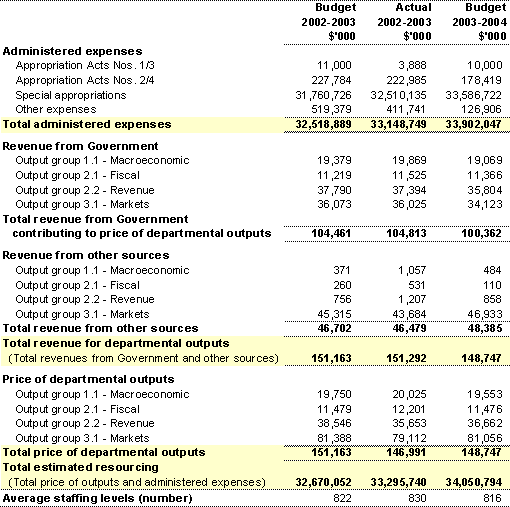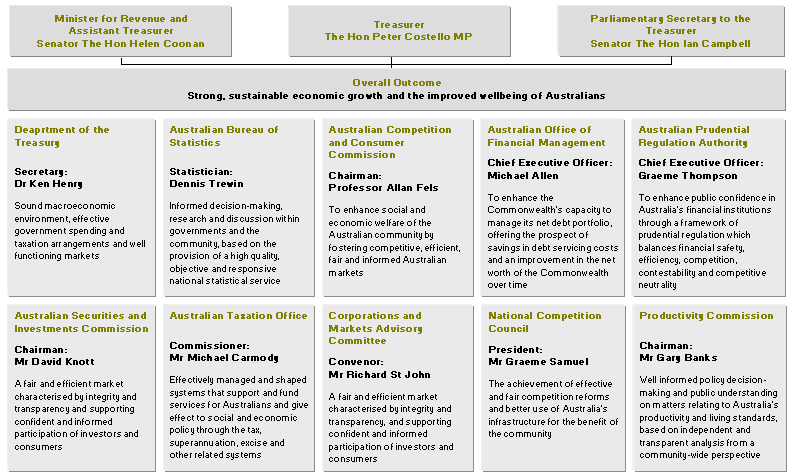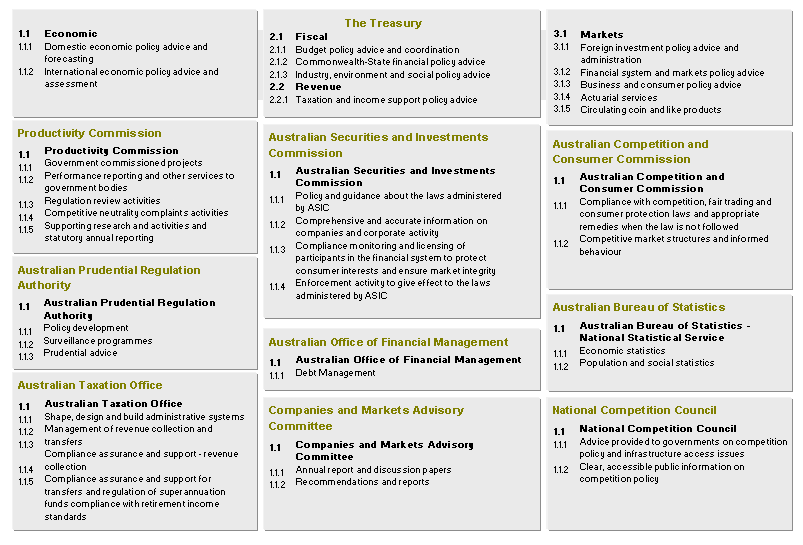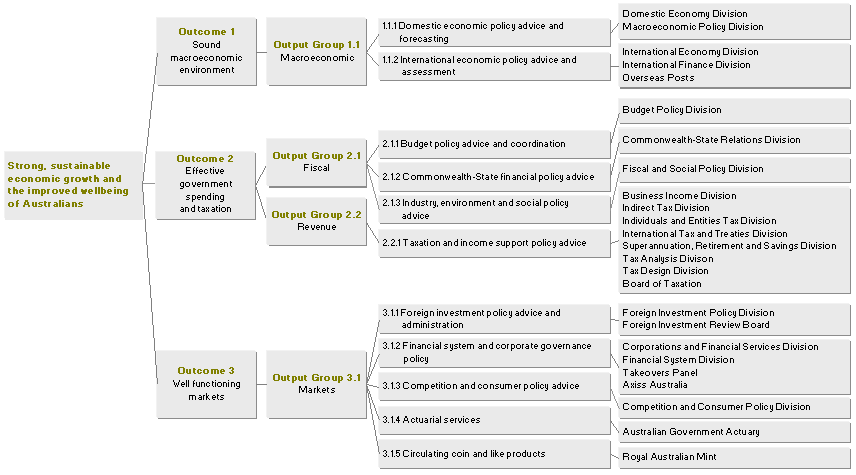Treasury's mission
Policy outcomes
Treasury services
Key relationships
Secretary's review
In 2002-03, through our policy advice and other leadership services to the Treasury ministers, and through our central policy agency work, we made considerable progress in pursuit of our mission to improve the wellbeing of the Australian people.
Economic challenges
While aggregate economic outcomes for 2002-03 compared favourably with much of the rest of the world, with GDP growth of 2.7 per cent and the unemployment rate falling to about 6 per cent, the economic environment was challenging. The economy was buffeted by a weak world economy, the most extensive drought in Australian meteorological records, the Severe Acute Respiratory Syndrome epidemic and the war in Iraq.
A strong budget outcome was achieved, with an underlying cash surplus of $7.5 billion, and a further reduction in the level of net Australian Government general government debt to 3.9 per cent of GDP (the lowest in 20 years).
Australia's macroeconomic resilience owes a considerable amount to the credible medium-term frameworks that have been implemented to guide monetary and fiscal policies. But macroeconomic resilience has been enhanced too by the extensive program of reforms in competition policy, the tax system, the labour market, the financial sector and corporate law.
Policy priorities
Across the activities for which the Treasury has responsibility four themes dominated in 2002-03: (1) the pressure of international events; (2) an enhanced contribution to the whole-of-government work on the Government's strategic priorities; (3) major policy reviews in several areas of core policy responsibility; and (4) a substantial program of policy reform implementation.
International developments affected our work in a number of ways. We have contributed directly to the efforts to re-build Iraq and to technical capacity building with our counterparts in Asia and the Pacific. In addition, we have continued to work through multilateral forums to address development needs to reduce poverty and to build policy capacity around the world. We have also contributed to efforts to deal with the new security environment. (One consequence of terrorism incidents around the world was a disruption of the domestic insurance market. The disruption has been addressed, with the creation by the Government of the Australian Reinsurance Pool Corporation.) And we have worked to create stronger trade and investment links through the review of international taxation arrangements, the development of a model law for cross-border insolvency, and participation in free trade agreement negotiations.
A second theme in our work in 2002-03 was an enhanced contribution to cross-agency reviews of public policy.
As a central policy agency we have sought to make a useful contribution to the whole-of-government work on the Government's strategic policy priorities. We are leading the work of the inter-departmental demographic task force. During 2002-03 we also played a strong role in the consideration of energy and environmental issues, and in the consideration of social welfare policy issues.
2002-03 was a particularly busy year for reviews and reform initiatives in core areas of policy responsibility - a third theme for the year. We undertook a review of the Commonwealth securities market, provided the secretariat for the review of the Trade Practices Act, and prepared and consulted on CLERP 9 regarding an effective regulatory and disclosure regime for corporations. A range of insurance market issues were handled, including providing the secretariat to, and then managing the outcomes from, the review of the law of negligence, and contributing to the HIH Royal Commission.
The fourth theme was our work in implementing and administering Government decisions. During 2002-03, we continued to work on the implementation of the Government's taxation and superannuation reforms, including the creation of the position of the Inspector-General of Taxation, and a range of changes to market and corporate governance regulation flowing from earlier reviews.
We worked closely with the agencies within the portfolio that administer the regulatory frameworks for markets - notably the RBA, APRA, ASIC and ACCC - in implementing the Government's reforms. The major changes for the portfolio agencies were in the implementation of new governance arrangements for APRA and the shift from the Australian Taxation Office to Treasury of responsibility for the tax law design function.
Our organisational changes
In 2002-03, we significantly restructured the department, with a move from three to four policy groups. We continued to implement changes to our governance and people management systems, enhancing our central policy agency capabilities. A separate Revenue Group was formed to incorporate the tax law design function transferred from the ATO. And a new Fiscal Group was created.
In June 2003, the Government announced that, from 1 July, Axiss Australia would operate as a division of Invest Australia, the national inward investment agency, in the Department of Industry, Tourism and Resources.
The governance arrangements of the department were also strengthened with clearer roles being established for the work of the executive and a strengthening of the audit committee. Human resource systems were improved. A more competitive pay model was introduced with the implementation of our third certified agreement and the offer of workplace agreements to middle-level staff.
In 2002-03 Graeme Moffatt retired from the position of Controller of the Royal Australian Mint (part of the Treasury department), after almost five years. Graeme's term included major successes, such as the management, jointly with The Perth Mint, of the Sydney 2000 Olympic Coin Program and conduct of the Centenary of Federation Coin Program. We wish him well in his retirement. Dr Vivienne Thom, formerly Commissioner of Patents at IP Australia was appointed Mint Controller in October.
2003-04 outlook
In 2003-04, three substantial drivers will have a particular impact on our work: the short-term economic outlook; the immediate policy priorities of Government; and longer-term factors affecting the wellbeing of the Australian people.
The work involved in addressing these drivers is complex. We will have to ensure that our resources and management systems, which define and support our capabilities, are aligned with these challenges.
I want to thank all Treasury staff for their extraordinary, highly professional commitment to the demanding work that supported good public policy outcomes in 2002-03. For some of our people 2002-03 was a demanding year for personal reasons as well. Some lost their homes in the severe bushfires that affected Canberra and surrounding areas early in 2003. I know that they would want me to pay tribute to their colleagues and other people in the broader Canberra community who were so generous with their support in this time of crisis.
Ken Henry
Secretary to the Treasury
Corporate statement
Treasury's mission
Treasury's mission is to improve the wellbeing of the Australian people by providing sound and timely advice to the Government, based on objective and thorough analysis of options, and by assisting Treasury Ministers in the administration of their responsibilities and the implementation of government decisions.
Policy outcomes
In carrying out its mission, Treasury is currently responsible for the following policy outcomes:
- sound macroeconomic environment;
- effective government spending and taxation arrangements; and
- well-functioning markets.
Outcome 1: Sound macroeconomic environment
A sound macroeconomic environment is an essential foundation for strong sustainable economic growth and the improved wellbeing of Australians. It is characterised by stable prices, low interest rates, healthy economic and employment growth, and a sustainable external position.
As many influences on macroeconomic outcomes are beyond the control of the Government, policy aims to improve the prospects of the Australian economy, rather than to target specific outcomes or major economic indicators. Success is judged more by medium to long-term performance relative to Australia's past and to other countries, rather than by particular results in any year.
Treasury aims to contribute to a sound macroeconomic environment through the delivery of the following outputs:
- ongoing development of a deep understanding of the operations of the Australian economy and how government action might influence it;
- monitoring and assessing economic conditions and prospects, both in Australia and overseas, and by providing advice on the formulation and implementation of effective macroeconomic policy, including monetary and fiscal policy; and
- providing strategic influence on Australia's, and assisting portfolio ministers in their, international interactions.
Macroeconomic Group is responsible for the outputs associated with Outcome 1.
Outcome 2: Effective government spending and taxation arrangements
Government spending and taxation arrangements contribute to the overall fiscal outcome and also influence strong sustainable economic growth and the improved wellbeing of Australians.
Spending measures should be effective in meeting their stated objectives, minimise behavioural distortions and deliver significant economic and other benefits compared with costs, thus contributing to the wellbeing of Australians. Taxation measures should meet revenue objectives (or other public policy objectives) and have regard to the principles of economic efficiency, horizontal and vertical equity, certainty and transparency, whilst minimising compliance and administrative costs. By meeting these objectives, taxation measures contribute to wellbeing, either directly or by providing the revenue base to finance government services.
Ongoing advice from Treasury to the portfolio ministers assists in formulating, implementing and explaining government spending and taxation decisions. Treasury does this by:
- monitoring and advising on the effective operation of the tax system;
- putting together the Budget as the key strategic government planning and resource allocation tool of the Government;
- providing high quality input into government consideration of expenditure programs; and
- advising on the effective financial operations of government collectively in Australia (including in relation to Commonwealth debt management).
Responsibility for the outputs associated with Outcome 2 are shared between Fiscal Group and Revenue Group. Fiscal Group is responsible for budget policy advice and coordination and for Commonwealth-State financial policy advice. Fiscal Group also provides advice on social policy, industry and environment policy, defence and national security policy. Revenue Group is responsible for taxation and income support policy advice, including responsibility for the development of tax legislation.
Outcome 3: Well-functioning markets
Well-functioning markets contribute to the achievement of high sustainable economic and employment growth and the wellbeing of Australians, by enabling resources to flow to those parts of the economy where they can be used most productively.
Well-functioning markets operate when investors and consumers have confidence and certainty in making decisions that are well informed and free of market distortions and impediments.
Treasury provides advice on policy processes and reforms that promote a secure financial system and sound corporate practices, remove impediments to competition in product and services markets and safeguard the public interest in matters such as consumer protection and foreign investment. The effective implementation and communication of the Government's position is also critical to achieving this outcome.
Markets Group is responsible for the outputs associated with Outcome 3.
Treasury services
The policy priorities for the Treasury are shaped by the Government's policy objectives associated with each policy outcome. This requires Treasury to:
- service its ministers' needs for advice and assist with current issues;
- understand the broader framework within which policy issues will arise, and advise ministers of developments and implications in a timely manner; and
- be strategic in identifying and leading the management of policy issues, including influencing the broader debate on issues.
Treasury's prime output in doing so is the provision of sound policy advice to its ministers. The key services that underpin Treasury's outputs include:
- advice on policy development;
- quantitative analysis;
- policy implementation and legislation development;
- public information and understanding; and
- administration of legislation and programs.
Treasury usually works with other agencies and departments so the particular role of Treasury, and indeed each group, in relation to each service, can vary across different fields of policy work.
The delivery of Treasury's services is undertaken in accordance with Treasury's people values, embodied in Treasury's Performance Management System and the APS values framework more generally.
Organisational focus
Treasury seeks to carry out its mission by:
- maintaining effective liaison with portfolio ministers and their offices and with other government departments;
- maintaining extensive contact with other levels of government, research institutes and interest groups;
- giving priority in operational arrangements to identifying important emerging issues, undertaking longer-term research and ensuring regular internal discussion of key policy issues;
- creating an environment for better informed public debate by explaining the Government's policy settings and views on economic conditions;
- fostering a consultative management culture within the department;
- efficiently organising departmental resources to provide high quality, relevant and timely advice;
- promoting continuous improvement, including staff management, development and skills enhancement; and
- undertaking internal and external review and evaluation of strategies, processes and outcomes.
Key skills
Treasury needs a range of skills to deliver effectively the services required by the Treasury ministers. These include:
- a deep understanding of the operation of the economy and of the workings and priorities of government, and associated interrelationships;
- a capacity to conceptualise and analyse individual issues within this broad context;
- an ability to analyse issues from a broad public interest perspective, taking account of the wide range of information available;
- knowledge of the likely effects of policy choices (drawing on an authoritative understanding of economic, budgetary, social, cultural, political and compliance implications of change); and
- the ability to assist ministers in making sustaina
ble judgements, including through clear and well thought out communication.
Key relationships
For the Treasury to be effective as a central portfolio department, it must foster productive working relationships across government and non-government sectors. These relationships need to be cultivated and maintained.
Treasury's most important relationship is with the Treasury ministers, built through effective service delivery. Effective service delivery, however, relies on other key relationships. Strong, working relationships with the ministers' offices and other departments, as well as other parts of the Treasury portfolio, including Australian Taxation Office, Australian Bureau of Statistics and regulatory authorities, are imperative to effectively developing and communicating policy advice. Relationships with the States and community groups, including the business sector, also are important to develop trust and credibility in the community and gain the breadth of knowledge and differing perspectives required to undertake policy analysis.
Looking beyond the domestic setting, Treasury also needs to continually build links internationally including through the foreign posts and involvement in international forums.
Treasury people values1
Treasury people management principles
- There will be open, two-way communication at all levels.
- Accountabilities will be clearly defined.
- Remuneration will be based on work performance and determined by fair and transparent processes.
- Staff will be assisted in achieving appropriate work and private life balance.
Treasury people
- Strive for excellence.
- Value teamwork, consultation and sharing ideas.
- Value diversity among our people.
- Treat everyone with respect.
- Exhibit honesty in all our dealings.
- Treat colleagues with fairness.
Table 1: Treasury financial and staffing resources summary

Note:
Budget 2002-03: Refer to Outcome Resources Tables 2, 3 and 4 for details of variations.
The Actual for 2002-03 is as per the Audited 2002-03 Financial Statements.
The Budget for 2003-04 is as per the 2003-04 Portfolio Budget Statements (unless otherwise stated).
Figure 1: Treasury portfolio outcome structure (as at 30 June 2003)

Figure 2: Portfolio output structure (as at 30 June 2003)

Figure 3: Treasury output structure (as at 30 June 2003)

Figure 4: Treasury top management structure (as at 30 June 2003)
|
Secretary: Ken Henry |
|
|
Corporate Strategy |
Corporate Services |
|
Macreconomic Group: Executive Director Martin Parkinson |
|
| Chief Adviser, International: Veronique Ingram
Domestic Economy Division Macroeconomic Policy Division International Economy Division International Finance Division |
Washington Minister-Counsellor (Economic) Nigel BaileyLondon Counsellor (Economic) Olaf Schuermann Paris Minister-Counsellor Tokyo Minister-Counsellor Beijing Minister-Counsellor Jakarta Counsellor |
|
Fiscal Group: Executive Director Richard Murray |
|
| Budget Policy General Manager: David MartineIndustry, Environment and Defence General Manager: Maryanne Mrakovcic |
Commonwealth-State Relations General Manager: Jan HarrisSocial Policy Division General Manager: David Tune |
|
Revenue Group: Executive Director Greg Smith |
|
| International Tax and Treaties Division General Manager: David ParkerIndividuals and Entities Tax Division General Manager: Paul McCullough Tax Analysis Division Business Income Division |
Tax Design Division General Manager: Deidre GerathySuperannuation, Retirement and Savings Division General Manager: Roger Brake Indirect Tax Division Board of Taxation |
|
Markets Group: Executive Director Jim Murphy |
|
| Foreign Investment Policy Division General Manager: Chris LeggStrategy, Consumer and Group Services Division General Manager: Sue Vroombout (A/g) Financial System Division Competition and Consumer Policy Division |
Corporation and Financial Services Division General Manager: Mike RawstronAustr alian Government Actuary General Manager: Peter Martin Takeovers Panel Axiss Australia |
1 Treasury has its own agency values reflecting and supporting the way it functions. The Australian Public Service (APS) recognises that agencies may adopt their own values and that these do not override the APS Values.